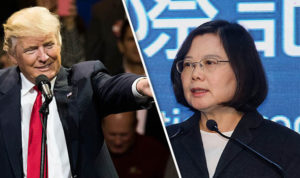by WorldTribune Staff, December 4, 2016
“Donald Trump took the call. The voice on the other end of the line was Taiwan’s president [Tsai Ing-wen] congratulating him,” wrote the Wall Street Journal’s Andrew Browne in Taipei, Taiwan.
Why the furor that subsequently erupted in the U.S. media?

“No president-elect, or president, has spoken to a Taiwan leader since Washington cut formal diplomatic ties with Taipei and recognized the People’s Republic in 1979,” the report explained.
For China watchers worldwide, it was a moment of high drama. For Michael Turton, a China watcher-watcher living in Taipei, the ironies of this ‘sh–tstorm’ were delicious.
“I returned home in the afternoon to find that the international media had melted down and commentators were in an uproar because President Tsai Ing-wen of Taiwan had been on the phone with President-elect Trump of the United States. My inbox is filled with messages, Twitter is like a house on fire.”
A colleague had written him that “it’s amazing to see how well trained the international media is to carry Beijing’s water. China doesn’t even need to release as much as a press statement, and the media is mindlessly anticipating Beijing’s talking points.
As the Guardian was quick to trumpet: ‘Trump’s phone call with Taiwan president risks China’s wrath‘.
“Note that nothing that China does ever angers anyone,” Turton observed.
“The international media serves Beijing by claiming actions are “provocative” and “sure to anger Beijing” … Apparently Rachel Maddow, who as a good progressive really ought to be celebrating this phone call to the head of democracy with no guns and a world-leading national health insurance program, said on national TV that “this is how wars start.”
Initially Beijing’s response was mild. Asked about the call in Beijing early Saturday, China’s foreign minister, Wang Yi, called it a “small action” that “cannot change China’s standing in international society.”
Turton argued that media reaction was providing a cover for China to strongly protest the signal of a change in the U.S. tolerant posture toward China’s aggressive trade and military posture.
An example: “The Chinese leadership will see this as a highly provocative action, of historic proportions,” Evan Medeiros, former Asia director at the White House National Security Council, told the Financial Times. “Regardless if it was deliberate or accidental, this phone call will fundamentally change China’s perceptions of Trump’s strategic intentions for the negative. With this kind of move, Trump is setting a foundation of enduring mistrust and strategic competition for U.S.-China relations.”
Turton also pointed to repeated errors by U.S. media reports on U.S. policy to the China-Taiwan issue.
“CNN several times stated that Taiwan was part of China, and of course Huffington Post erroneously claimed that ‘The United States and most of the international community acknowledge China’s claim of sovereignty over Taiwan.’ The US acknowledges, but does not recognize, China’s desire to annex Taiwan,” Turton wrote.
He then pointed to additional ironies in the global pro-China establishment’s “meltdown” over the Trump phone call with Taiwanese President Tsai Ing-wen.
“The KMT [Taiwan’s once-dominant and now opposition party] first blasted it. … Then that article was taken down and the new line came down: the KMT thanked Trump for supporting the Republic of China. LOL.
Isn’t it great that President Obama, paragon of progressive values and the rule of law, … finally said “To hell with the Chinese, I’m picking up the phone and calling President Tsai!” Oh, sorry. That was Trump,” Turton wrote.
Meanwhile, the U.S. media continues to misstate U.S. policy on Taiwan. Even conservative critic Charles Krauthammer got it wrong:
“The Chinese are extremely sensitive about these nuances in diplomacy,” he said on Fox News. “They’ve been at it for four thousand years, and the rules were laid down by Kissinger and Nixon when they made the opening, and it was that we’d be allies of Taiwan, but we would have to observe certain rules… that Taiwan is part of China.”
